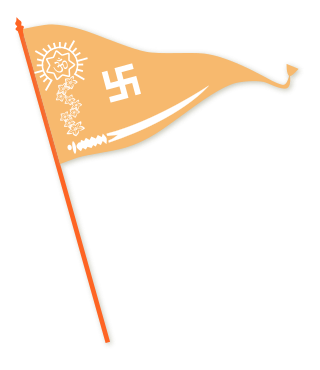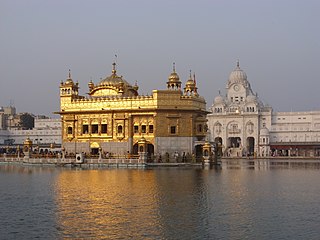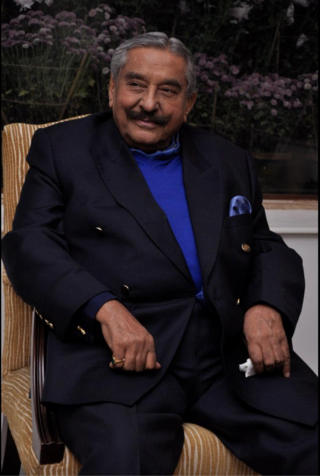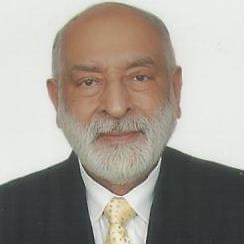Related Research Articles

The 14th Lok Sabha was convened after the 2004 Indian general election held in four phases during 20 April – 10 May 2004, which led to the formation of first Manmohan Singh ministry (2004–2009). Indian National Congress-led United Progressive Alliance won 62 more seats than previous 13th Lok Sabha. The Lok Sabha is the lower house in the Parliament of India. 8 sitting members from Rajya Sabha, the Upper House of Indian Parliament, were elected to 14th Lok Sabha after the 2004 Indian general election.

Akhil Bharat Hindu Mahasabha is a Hindu nationalist political party in India.

Amarinder Singh, is an Indian politician, military historian, former royal and Indian Army veteran who served as the 15th Chief Minister of Punjab. His father was the last Maharaja of the princely state of Patiala. Before starting his political career, Singh was an officer in the Indian Army, where he served from 1963 to 1966.

Balram Jakhar was an Indian politician, who served as the Speaker of the Lok Sabha and Governor of Madhya Pradesh. He was also the longest serving Speaker of the Lok Sabha, whose tenure lasted 9 years and 329 days. Jakhar was among the popular faces of Jat politics in Rajasthan during 1980s. He served as the Minister of Agriculture and Farmers Welfare from 1991 to 1996 in Government of India. He was a member of Indian National Congress.

Beant Singh was an Indian politician and the 12th Chief Minister of Punjab from 1992 to 1995. He was a member of Indian National Congress. He was assassinated in a suicide bombing.

Amritsar district is one of the twenty three districts that make up the Indian state of Punjab. Located in the Majha region of Punjab, the city of Amritsar is the headquarters of this district.

Patiala district is one of the twenty three districts in the state of Punjab in north-west India.

Jalandhar district is a district in Doaba region of the state of Punjab, India. The district headquarters is the city of Jalandhar.

Ludhiana district is one of the 23 districts in the Indian state of Punjab. It is Punjab's largest district by both area and population. Ludhiana, the largest city in Punjab, is the district headquarters.

Sir Bhupinder Singh, was the Maharaja of Patiala and a cricket player. Singh's reign as Maharaja of the princely state of Patiala, in British India, lasted from 1900 to 1938. He was born in a Sidhu royal Jat Sikh family. During his reign, Singh was most noted for his extravagance, contributions to sports, and for being an ally to the British Raj. He was also a member of the Phulkian dynasty.
Rahon is a city and a municipal council in the district Shaheed Bhagat Singh Nagar of the Indian state of Punjab. Rahon is in Doaba region of Punjab. Doaba also known as Bist Doab, is the region of Punjab, India that lies between the Beas River and the Sutlej River. A famous battle was fought here between Sikhs and Mughals i.e Battle of Rahon (1710).

Dr. Gurdial Singh Dhillon was an Indian politician from the Indian National Congress party. He served as the Speaker of the Lok Sabha twice, President of the Inter-Parliamentary Union (1973–76) and Indian High Commissioner to Canada (1980–82).
Prem Kishan Khanna was an active member of the Hindustan Republican Association from Shahjahanpur U.P. Khanna was a contractor for Indian Railways. He was a close associate of noted revolutionary Ram Prasad Bismil.
Kewal Singh Choudhary (1915–1991) was an Indian diplomat, Foreign Secretary and India's ambassador to the USSR, Indian High Commissioner to Pakistan and USA. He was a 1955 recipient of the Indian civilian honour of Padma Shri.

Amarnath Vidyalankar was an Indian politician, social worker and journalist. He was involved in the independence movement and became a member of the Indian National Congress before India's independence in 1947. After independence, Vidyalankar served as Minister of Education, Labor and Languages in the Government of Punjab from 1957 to 1962 and was a member of the First (1952–1956), Third (1962–1967) and Fifth (1971–1977) Lok Sabhas.

Lala Achint Ram was an Indian freedom fighter, Gandhian and a member of the Indian National Congress party.

Vipin Kumar Khanna was an Indian businessman, financier and army officer. Khanna had diverse business interests. He founded Dynamic Sales Service International, a commodities trading and marketing company, which further expanded into railways, infrastructure, telecommunications equipment, shipbroking, fast-moving consumer goods and additional industries. Khanna also had other business interests, which included interests in the arms, aerospace, software, investment banking, hospitality, real estate, alcohol and drinks industries. He was a Non-Resident Indian based in London, England, and also had a base in Delhi, India.

Arvind Khanna is an Indian politician, businessman, investor and philanthropist. Khanna is a member of the Bharatiya Janata Party (BJP), which he joined in January 2022. He is a senior leader of the BJP and a prominent figure in BJP Punjab. He is serving as Vice-President of BJP Punjab since December 2022 and is a member of BJP Punjab's core committee and finance committee. In his political career, Khanna has been known for using his wealth and engaging in philanthropy to further consolidate his influence. He served as the member of legislative assembly (MLA) from Sangrur from 2002 to 2007 and the MLA from Dhuri from 2012 to 2014. From 1998 to 2015, Khanna was a member of the Indian National Congress (INC). During his time in the INC, Khanna served as General Secretary of the Punjab Pradesh Congress Committee (PPCC), PPCC treasurer, President of the Punjab Youth Congress, and a member of the All India Congress Committee.

Vinod Kumar Khanna is an Indian businessman. Khanna held business interests in various industries in his career through the K Group companies he founded, including mining, real estate, railways, power, infrastructure, consultancy, hotels, and electronics. He has been noted for his influence in India and his links to foreign companies.
The Khanna family is a prominent Punjabi Hindu family originating from India. Members of the Khanna family have been involved in various fields, including business, finance, politics, philanthropy, sports, and sports administration. Khanna family members initially gained prominence and notability from the 1950s onwards. Through many of its members, the Khanna family is related to numerous other notable individuals and families.
References
- 1 2 3 Thacker's Indian Directory Embracing Whole of The Indian Empire 1936. Calcutta: Thacker's Press & Directories. 1936. p. 207.
- 1 2 All-India Dental Association (1925). Indian Dental Journal. Vol. 1. Indian Dental Journal. p. 96. Archived from the original on 15 March 2024. Retrieved 15 March 2024.
- 1 2 3 4 5 6 "History". K Group India. Archived from the original on 4 March 2024. Retrieved 15 March 2024.
- 1 2 Lok Sabha Debates: Appendix. Delhi: Lok Sabha Secretariat. 1958. pp. 28–29. Archived from the original on 15 March 2024. Retrieved 15 March 2024.
- 1 2 Lal, Sham (1969). The Times of India Directory & Yearbook: Including Who's Who. New Delhi: The Times of India Press. p. 563.
- 1 2 Gazette of India, 1969, No. 373 (in English and Hindi). New Delhi: Directorate of Printing, Government of India. 3 May 1969. p. 1547.
- 1 2 "IS 4798: Safety Pins". Internet Archive. Bureau of Indian Standards. 1968. p. 2. Retrieved 15 March 2024.
- 1 2 Free Masonry [i.e. Freemasonry] in India. Vol. 1 (2nd ed.). New Delhi: G.S. Gupta. 1991. p. 64. Archived from the original on 23 March 2024. Retrieved 23 March 2024.
- 1 2 3 4 5 6 Gupta, Kanta, ed. (1986). Yoga Nidhi (in Hindi and English). Yoga Mandir Prakashan Delhi. p. 202.
- 1 2 3 4 Committee on Public Undertakings (13 December 1967). "Fifth Report on Contract Entered into by State Trading Corporation of India Limited (with M/s Oval Industries Inc., New York for Import of sulphur) pertaining to Ministry of Commerce" (PDF). Parliament Digital Library. Lok Sabha Secretariat. p. 21. Archived (PDF) from the original on 12 February 2022. Retrieved 15 March 2024.
- ↑ Thought. Vol. 17. Delhi: Siddharta Publications. 1965. p. 14. Archived from the original on 15 March 2024. Retrieved 15 March 2024.
- ↑ Industrial Establishments in India. Vol. 6. New Delhi: Manager of Publications. 1966. p. 172. Archived from the original on 15 March 2024. Retrieved 15 March 2024.
- 1 2 Directory of Indian Exporters. New Delhi: Department of Commercial Intelligence and Statistics, Government of India. 1972. p. 107. Archived from the original on 23 March 2024. Retrieved 23 March 2024.
- ↑ Government of India (10 January 1963). Notices and other matters published by the Heads of Offices of the Delhi Administration. Miscellaneous matters not included in preceding section. Delhi: Delhi Administration. p. 24.
- ↑ Government of India (24 October 1963). Notices and other matters published by Heads of Offices of the Delhi Administration, Miscellaneous matters not included in preceding sections. Delhi: Delhi Administration. p. 25.
- 1 2 "Lok Sabha Debates (Ninth Session)" (PDF). Parliament Digital Library. Lok Sabha Secretariat. 24 December 1969. pp. 255–256. Archived (PDF) from the original on 15 March 2024. Retrieved 15 March 2024.
- ↑ "Written Answers: M/s Delhi Small Scale Industries" (PDF). Parliament Digital Library. Lok Sabha Secretariat. 20 August 1969. pp. 71–72. Archived (PDF) from the original on 15 March 2024. Retrieved 15 March 2024.
- ↑ "IS 4066: Metal Hooks, Clips and Eyes". Internet Archive. Bureau of Indian Standards. 1967. p. 2. Retrieved 15 March 2024.
- 1 2 "IS 1953: Methods of chemical analysis of silver anodes". Internet Archive. Bureau of Indian Standards. 1973. p. 2. Retrieved 15 March 2024.
- ↑ "IS 6882: Platinum electrodes". Internet Archive. Bureau of Indian Standards. 1973. p. 1. Retrieved 15 March 2024.
- ↑ Reed, Sir Stanley, ed. (1961). The Times of India Directory and Year Book Including Who's who. New Delhi: Bennett, Coleman & Company. p. 1288. Archived from the original on 15 March 2024. Retrieved 15 March 2024.
- ↑ Productivity News. Vol. 15–16. New Delhi: National Productivity Council of India. 1976. p. 7. Archived from the original on 15 March 2024. Retrieved 15 March 2024.
- ↑ "Lok Sabha Debates (Eighth Session)" (PDF). Parliament Digital Library. Lok Sabha Secretariat. 7 August 1969. pp. 98–99. Archived (PDF) from the original on 15 March 2024. Retrieved 15 March 2024.
- ↑ "Akashvani". Akashvani. XL (48). New Delhi: All India Radio: 2285. 7 December 1975. Archived from the original on 15 March 2024. Retrieved 20 April 2024.
- 1 2 "1st Course JSW". National Defence Academy. Archived from the original on 2 April 2023. Retrieved 15 March 2024.
- 1 2 3 "The Green House: About Us". IndiaMART. Archived from the original on 15 March 2024. Retrieved 15 March 2024.